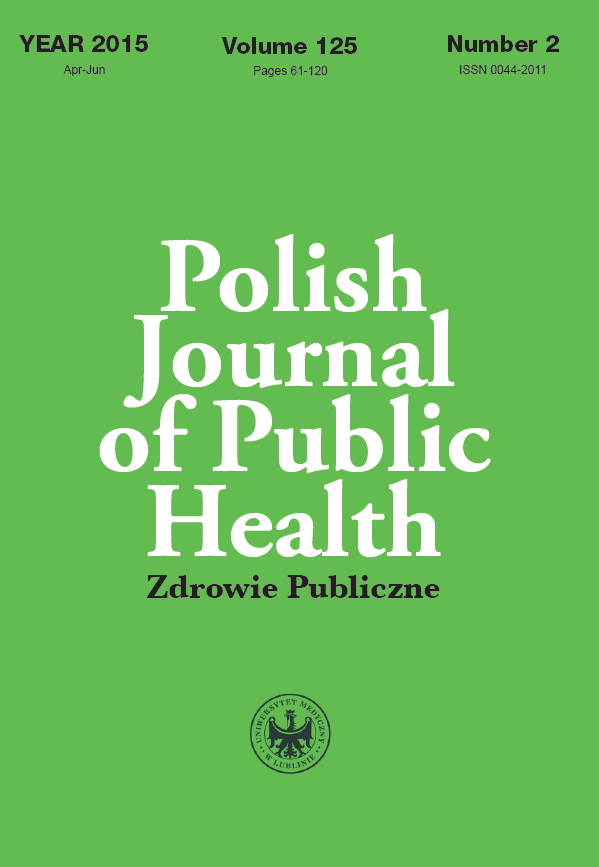Who needs patient satisfaction surveys? Perspectives of Polish doctors, nurses, and patients
DOI:
https://doi.org/10.1515/pjph-2015-0027Keywords:
patient satisfaction, questionnaires, patients, nurses, physiciansAbstract
Introduction. Patient satisfaction surveys are still popular tools for obtaining feedback on the quality of health care.
Nonetheless, there is a paucity of data to indicate whether health care providers even want patients to assess the quality of care delivered. Neither it is certain whether patients are interested in participating in such surveys.
Aim. To present and compare the perspectives of doctors, nurses, and patients on the validity of health care customer satisfaction surveys.
Material and methods. A cross-sectional survey design was used. The questionnaires were administered to doctors, nurses and patients in three hospitals of different sizes (small, medium, and large), all in the north-east of Poland. Each sample group was given 200 questionnaires; responses were received from 95 doctors (47.5%), 190 nurses (95%), and 182 patients (91%), and included in the final analyses.
Results. Most respondents (doctors – 64.2%; nurses – 61.6%; patients – 87.4%) answered ‘Yes’ to the question ‘Do you think that patients should evaluate the quality of health care?’ Analysis of data allowed to identify the following main reasons why patients should evaluate the quality of health care: 1. to enhance the quality of care; 2. to recognise patients as evaluators; 3. to motivate providers to work more efficiently; and 4. to emphasise the impact of evaluation on a core value, i.e. health. Doctors and nurses outlined reasons why they did not advocate conducting patient satisfaction surveys: satisfaction surveys are redundant; negative evaluations; unwillingness to be evaluated by patients; satisfaction surveys hamper effective work with patients; surveys are not objective; survey results are not communicated to providers.
Conclusions. Patient satisfaction surveys are desirable tools for evaluating the quality of health care delivery despite
the fact that they frequently raise concerns amongst providers and patients. There is, therefore, a definite need for providers to experience the benefits of measuring patient satisfaction. Another important practical implication is that patients need to be convinced that their opinions do matter and contribute to improving the quality of services.
References
1. Donabedian A. Edited by Rashid Bashshur. An Introduction to Quality Assurance in Health Care. Oxford: Oxford University Press; 2003.
2. Kmietowicz Z. Patients don’t understand question often used to measure satisfaction in NHS. Brit Med J. 2012;344:e4242.
3. Teijlingen van ER. Theoretical foundation needed. Brit Med J. 2010;341:c6319.
4. Fitzpatrick R. Scope and measurement of patient satisfaction. In: R. Fitzpatrick, A. Hopkins (ed). Measurement of patients’ satisfac¬tion with their care. London: Royal College of Physicians of London; 1993.
5. Kersnik J. An evaluation of patient satisfaction with family practice care in Slovenia. Int J Qual Health Care. 2000;12(2):143-7.
6. Polluste K, Kalda R, Lember M. Satisfaction with the access to the health services of the people with chronic conditions in Estonia. Health Policy. 2007;82:51-61.
7. Marcinowicz L, Konstantynowicz J, Chlabicz S. The patient’s view of the acceptability of the primary care in Poland. Int J Qual Health Care. 2008;20:277-83.
8. Klemenc-Ketis Z, Petek D, Kersnik J. Association between family doc¬tors’ practices characterstics and patient evaluation of care. Health Pol¬icy. 2012;106:269-75.
9. Senic V, Marinkovic V. Patient care, satisfaction and service quality in health care. Int J Consumer Studies. 2013;37(3):312-9.
10. Bowling A. Research methods in health. Investigating health and health services. 2nd ed. Buckingham, Philadelphia: Open University Press; 2002. p. 279.
11. Oppenheim AN. Questionnaire Design, Interviewing and Attitude Meas¬urement. Poznan: Zysk i S-ka Wydawnictwo; 2004. p. 299-319.
12. Coulter A, Magee H. (eds). The European patient of the future. New York: Open University Press; 2003.
13. Davies E, Cleary PD. Hearing the patient’s voice? Factors affecting the use of patient survey data in quality improvement. Qual Safety in Health Care. 2005;14:428-32.
Downloads
Published
Issue
Section
License
Copyright (c) 2015 Polish Journal of Public Health

This work is licensed under a Creative Commons Attribution-NonCommercial-NoDerivatives 3.0 Unported License.


